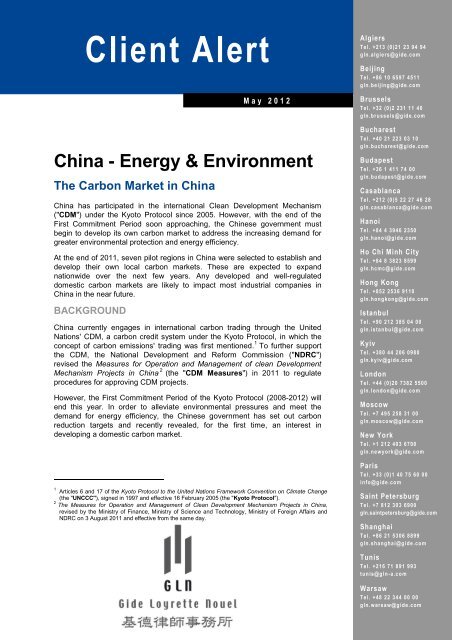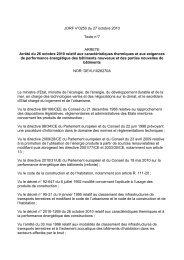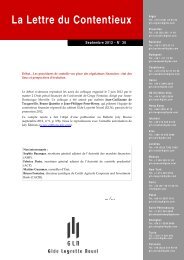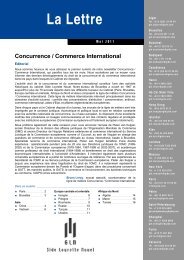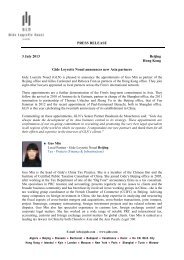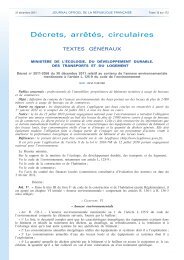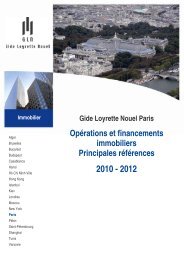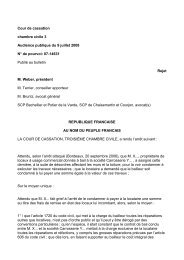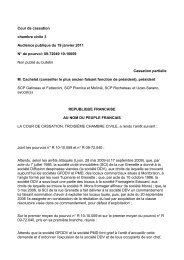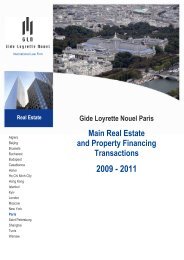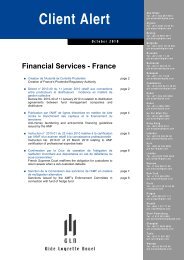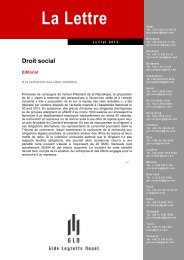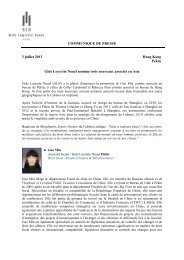Client Alert - Gide Loyrette Nouel
Client Alert - Gide Loyrette Nouel
Client Alert - Gide Loyrette Nouel
Create successful ePaper yourself
Turn your PDF publications into a flip-book with our unique Google optimized e-Paper software.
<strong>Client</strong> <strong>Alert</strong><br />
China - Energy & Environment<br />
The Carbon Market in China<br />
China has participated in the international Clean Development Mechanism<br />
("CDM") under the Kyoto Protocol since 2005. However, with the end of the<br />
First Commitment Period soon approaching, the Chinese government must<br />
begin to develop its own carbon market to address the increasing demand for<br />
greater environmental protection and energy efficiency.<br />
At the end of 2011, seven pilot regions in China were selected to establish and<br />
develop their own local carbon markets. These are expected to expand<br />
nationwide over the next few years. Any developed and well-regulated<br />
domestic carbon markets are likely to impact most industrial companies in<br />
China in the near future.<br />
BACKGROUND<br />
M a y 2 0 1 2<br />
China currently engages in international carbon trading through the United<br />
Nations' CDM, a carbon credit system under the Kyoto Protocol, in which the<br />
concept of carbon emissions' trading was first mentioned. 1 To further support<br />
the CDM, the National Development and Reform Commission ("NDRC")<br />
revised the Measures for Operation and Management of clean Development<br />
Mechanism Projects in China 2 (the "CDM Measures") in 2011 to regulate<br />
procedures for approving CDM projects.<br />
However, the First Commitment Period of the Kyoto Protocol (2008-2012) will<br />
end this year. In order to alleviate environmental pressures and meet the<br />
demand for energy efficiency, the Chinese government has set out carbon<br />
reduction targets and recently revealed, for the first time, an interest in<br />
developing a domestic carbon market.<br />
1 Articles 6 and 17 of the Kyoto Protocol to the United Nations Framework Convention on Climate Change<br />
(the "UNCCC"), signed in 1997 and effective 16 February 2005 (the "Kyoto Protocol").<br />
2 The Measures for Operation and Management of Clean Development Mechanism Projects in China,<br />
revised by the Ministry of Finance, Ministry of Science and Technology, Ministry of Foreign Affairs and<br />
NDRC on 3 August 2011 and effective from the same day.<br />
Algiers<br />
T e l . +213 (0 )21 2 3 9 4 9 4<br />
g ln .a lg ie rs@g id e . c o m<br />
Beijing<br />
T e l . +86 1 0 6 5 9 7 4 5 1 1<br />
g ln .b e i j in g @g id e .c o m<br />
Brussels<br />
T e l . +32 (0)2 2 3 1 1 1 4 0<br />
g ln .b ru s s e ls @g id e .c o m<br />
Bucharest<br />
T e l . +40 2 1 2 2 3 0 3 1 0<br />
g ln .b u c h a res t@g id e . c o m<br />
Budapest<br />
T e l . +36 1 4 1 1 7 4 0 0<br />
g ln .b u d a p e s t @g id e .c o m<br />
Casablanca<br />
T e l . +212 (0 )5 2 2 2 7 4 6 2 8<br />
g ln .c a s a b l a n c a @g id e .c o m<br />
Hanoi<br />
T e l . +84 4 3 9 4 6 2 3 5 0<br />
g ln .h a n o i@g id e . c o m<br />
Ho Chi Minh City<br />
T e l . +84 8 3 8 2 3 8 5 9 9<br />
g ln .h c m c @g id e .c o m<br />
Hong Kong<br />
T e l . +852 2 5 3 6 9 1 1 0<br />
g ln .h o n g k o n g @g id e . c o m<br />
Istanbul<br />
T e l . +90 2 1 2 3 8 5 0 4 0 0<br />
g ln . is tanbu l@g id e .c o m<br />
Kyiv<br />
T e l . +380 4 4 2 0 6 0 9 8 0<br />
g ln .k y iv @g id e .c o m<br />
London<br />
T e l . +44 (0)20 7 3 8 2 5 5 0 0<br />
g ln . lo n d o n @g id e .c o m<br />
Moscow<br />
T e l . +7 4 9 5 2 5 8 3 1 0 0<br />
g ln .mosco w @g id e .c o m<br />
New York<br />
T e l . +1 2 1 2 4 0 3 6 7 0 0<br />
g ln .n e wyork @g id e .c o m<br />
Paris<br />
T e l . +33 (0)1 4 0 7 5 6 0 0 0<br />
i n fo @g id e .c o m<br />
Saint Petersburg<br />
T e l . +7 8 1 2 3 0 3 6 9 0 0<br />
gln.saintpetersburg@gide.com<br />
Shanghai<br />
T e l . +86 2 1 5 3 0 6 8 8 9 9<br />
g ln .s h a n g h a i @g id e .c o m<br />
Tunis<br />
T e l . +216 7 1 8 9 1 9 9 3<br />
t u n is @g ln -a .c o m<br />
Warsaw<br />
T e l . +48 2 2 3 4 4 0 0 0 0<br />
g ln .w a rsa w @g id e .c o m
2.<br />
China’s 12th Five-Year Plan 3 sets a target to cut carbon intensity by 17% between 2011 and 2015. To achieve<br />
these goals, the Chinese government is encouraging a carbon trading scheme in pilot regions and industrial<br />
sectors in the hope of gradually establishing a nationwide carbon market. 4 To further implement these policies, on<br />
29 October 2011, the NDRC issued the Notice on Launching a Pilot Program for the Carbon Market (the "Pilot<br />
Program Notice"). 5 The Pilot Program will begin carbon market trials in certain provinces and cities.<br />
SUMMARY OF THE CARBON MARKET IN CHINA<br />
International CDM Project<br />
The CDM is primarily an international mechanism described in the Kyoto Protocol. Essentially, the CDM allows<br />
companies in developed nations to sponsor greenhouse gas reduction projects in "host" (developing) countries. As<br />
a result, the "sponsor" nation receives credits for offsetting emissions, which comes at a cost less than what it<br />
would be in its own country, while the host country obtains investment from the implementation of low-carbon<br />
technologies.<br />
For a project to be approved, both the host and developed countries must be member states of the UNCCC and<br />
Kyoto Protocol. The host country must have approved the project, and the positive impact of the project on the<br />
environment must be proven by engineering and certification entities known as "designated operational entities".<br />
Lastly, the international body in charge of overseeing certified emission rights (the "CDM Executive Board") must<br />
have entered the issuance of credits into the CDM registry. Thus, any Chinese approval is only part of a broader<br />
approval mechanism.<br />
As far as Chinese approval is concerned, the CDM Measures stipulate the following approval procedure for CDM<br />
projects:<br />
Step<br />
Step 1<br />
Step 2<br />
Step 3<br />
Step 4<br />
Approval Procedure<br />
The project owner submits required documents, including the Project Design Document, to the NDRC or its<br />
provincial counterparts.<br />
The NDRC, after receiving the application from project owner or handed in by its local counterparts, will entrust<br />
relevant organizations with an expert review of the project.<br />
The National CDM Board will review the application and make its decision accordingly.<br />
The NDRC, with the Ministry of Science and Technology and Ministry of Foreign Affairs, will approve or reject the<br />
application in accordance with the decision of the National CDM Board and issue a letter to the applicant on behalf<br />
of the Chinese government.<br />
Pilot Program on Domestic Carbon Trade<br />
According to the newly issued Pilot Program Notice, there are seven provinces and cities involved in the Pilot<br />
Program, namely: Beijing, Tianjin, Shanghai, Chongqing, Hubei, Guangdong and Shenzhen (collectively the "Pilot<br />
Regions"). Compared to the national target to reduce carbon intensity by 17% in the 12th Five-Year Plan, Beijing<br />
(18%), Tianjin (19%), Shanghai (19%) and Guangdong (19.5%) 6 have higher reduction targets, for which the pilot<br />
experiment will act as a market solution to help meet their goals.<br />
The Pilot Program Notice stipulates four main measures for establishing the domestic carbon market:<br />
• The Pilot Program requires support from local implementing rules, which are to be drafted by the Pilot Regions<br />
respectively and approved by the NDRC.<br />
3 The 12 th Five Year Plan, promulgated by the National People's Congress on 16 March 2011 and effective from the same day.<br />
4 In December 2011, the State Council issued the Implementation Plan on Controlling Greenhouse Gas Emissions in the 12 th Five-Year Plan<br />
(promulgated by the State Council on 1 December 2011 and effective from the same day), which specified the need for a carbon market pilot program<br />
and a system to distribute emissions rights in the future.<br />
5<br />
Notice on Launching a Pilot Program for the Carbon Market promulgated by NDRC on 29 October 2011 and effective from the dame day.<br />
6 The Implementation Plan on Controlling Greenhouse Gas Emissions in the 12 th Five-Year Plan, promulgated by the State Council on 1 December 2011<br />
and effective from the same day.
3.<br />
• The Pilot Regions will control the overall emission credits within their administrative divisions and establish rules<br />
for credit allocation among local enterprises.<br />
• The regime to monitor and register carbon trades is also to be established locally.<br />
• Other supporting rules related to the carbon market, such as evaluation methods, will be clarified.<br />
In practice, the Pilot Regions now have their own trading platforms, which mainly provide transactions on<br />
environmental protection technology, energy efficiency technology and carbon credits. However, there have not yet<br />
been many successful precedents on carbon emissions trading because such trade is still voluntary for companies.<br />
We have identified two important precedents:<br />
• On 5 August 2009, Tianping Auto Insurance Co., Ltd. purchased credits equivalent to 8,026 tons of carbon<br />
emissions from the Beijing Environment Exchange 7 to compensate for the carbon emissions from its daily<br />
operations since 2004. It was the first known example of a Chinese company buying credits to offset its<br />
emissions.<br />
• On 11 November 2011, Shanghai Hongtai Real Estate Co. Ltd. purchased 2,012 tons of carbon credits from<br />
Shanghai Medical Instruments (Group) Co., Ltd. through the Shanghai Environment Energy Exchange 8 at the<br />
price of RMB 38 per ton to offset emissions from its Pujiang International Finance Plaza project.<br />
A STEP IN THE RIGHT DIRECTION<br />
The essential idea behind the carbon market is to promote energy efficiency by placing a monetary value on<br />
emissions. China has already been widely involved in international CDM projects, and it is now embracing for the<br />
first time the establishment of a viable carbon market within its national policies. Several Pilot Regions have begun<br />
introducing measures to test the carbon market, and such progress will likely have an impact on most industrial<br />
enterprises in the future.<br />
However, the Chinese domestic carbon market is still in its infancy and its complete implementation is still some<br />
years away. To date, carbon trading remains voluntary for enterprises, with the couple of successful precedents<br />
considered more as shows of corporate responsibility, rather than a routine and daily part of business operations.<br />
GLN will closely follow any legal developments relating to China's carbon market. Meanwhile, please contact us<br />
should you have any questions regarding environmental and energy laws and foreign investment in China.<br />
________________________<br />
7 The Beijing Environment Exchange was established on 5 August 2008 and operates under the direction of the National Lead Working Group for<br />
addressing Climate Change, Energy Conservation and Emissions Reduction. The Exchange lays a foundation for China to use market-based methods<br />
to solve problems relating to environmental protection, energy conservation and emissions reduction.<br />
8 The Shanghai Environment Energy Exchange, also set up on 5 August 2008, is mainly engaged in transactions concerning intellectual property rights<br />
(patents) to be transferred from foreign investors and equity to be transferred from local companies in which joint ventures are created. The Exchange<br />
offers a package of services for project developers, such as preparation of the project design, project appraisal, business planning, marketing, funding,<br />
and financial and technological support.<br />
<br />
This <strong>Client</strong> <strong>Alert</strong> was prepared by our China Green Energy Working Group - a cross-border, cross-disciplinary group<br />
focusing on legal issues and developments affecting foreign investment in the green energy sector in China. For<br />
further information, please contact one of our experts below.
4.<br />
Beijing<br />
Suite 3501, Jing Guang Center<br />
Hu Jia Lou, Chaoyang District<br />
Beijing 100020 - China<br />
Tel. +86 10 6597 4511<br />
Contacts<br />
Thomas Urlacher<br />
urlacher@gide.com<br />
Li Hua<br />
li.hua@gide.com<br />
Zheng Yu<br />
zheng@gide.com<br />
Liu Yue<br />
liu.yue@gide.com<br />
Shanghai<br />
Suite 2008, Shui-On Plaza<br />
333 Huai Hai Zhong Road<br />
Shanghai 200021 - China<br />
Tel. +86 21 5306 8899<br />
Contact<br />
Antoine de la Gatinais<br />
gatinais@gide.com<br />
Hong Kong<br />
Suites 1517-1519, Jardine House<br />
1 Connaught Place<br />
Central, Hong Kong SAR<br />
Tel. +852 2536 9110<br />
Contacts<br />
Rebecca Silli<br />
silli@gide.com<br />
Balbir Bindra<br />
bindra@gide.com<br />
Samuel Chau<br />
chau@gide.com<br />
Colin Mercer<br />
mercer@gide.com<br />
Paris<br />
26, cours Albert 1 er<br />
75008 Paris - France<br />
Tel. +33 (0)1 40 75 60 00<br />
Contacts<br />
Charles-Henri Leger<br />
leger@gide.com<br />
Guillaume Rougier-Brierre<br />
rougier@gide.com<br />
Stéphane Vernay<br />
vernay@gide.com<br />
David Boitout<br />
boitout@gide.com<br />
You can also find this <strong>Client</strong> <strong>Alert</strong> and our other newsletters on our website in the News/Publications section.<br />
This <strong>Client</strong> <strong>Alert</strong> is a free, periodical electronic publication edited by the law firm <strong>Gide</strong> <strong>Loyrette</strong> <strong>Nouel</strong> (the "Law Firm"), and published for <strong>Gide</strong> <strong>Loyrette</strong> <strong>Nouel</strong>’s clients and business<br />
associates. The <strong>Client</strong> <strong>Alert</strong> is strictly limited to personal use by its addressees and is intended to provide non-exhaustive, general legal information. The <strong>Client</strong> <strong>Alert</strong> is not intended to be and<br />
should not be construed as providing legal advice. The addressee is solely liable for any use of the information contained herein and the Law Firm shall not be held responsible for any<br />
damages, direct, indirect or otherwise, arising from the use of the information by the addressee. In accordance with the French Data Protection Act, you may request access to, rectification of,<br />
or deletion of your personal data processed by our Communications Department (privacy@gide.com).


